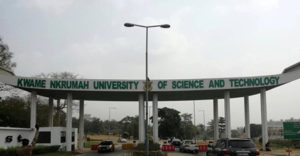KNUST scientists lead clinical trial of ‘Nibima’ for COVID-19 treatment
 Scientists (investigators) at the Department of Clinical Microbiology, Kwame Nkrumah University of Science and Technology (KNUST), are leading the clinical trial of “Nibima”, a local herbal preparation intended for use in the treatment of COVID-19.
Scientists (investigators) at the Department of Clinical Microbiology, Kwame Nkrumah University of Science and Technology (KNUST), are leading the clinical trial of “Nibima”, a local herbal preparation intended for use in the treatment of COVID-19.
Professor Christian Agyare, Provost of the College of Health Sciences, said the herbal product was currently undergoing various testing and approval processes at Ghana’s Food and Drugs Authority (FDA).
This follows results from laboratory studies conducted by the KNUST research team on the efficacy of the herbal product in fighting the novel coronavirus.
“We are liaising with the FDA for the final outcome on the herbal product,” Prof. Agyare told the Ghana News Agency (GNA), Kumasi, on the side-line of the Ninth College of Health Sciences Biennial Scientific Conference.
The University, according to him, was leading scientific research and public engagement to strengthen the country’s capacity in dealing with the pandemic.
The areas of engagement include studies on the clinical characterization, sero-prevalence of COVID-19 and the clinical trials of COVID-19 therapeutics and vaccines in the country.
“This form of engagement is the highest at the moment in any academic institution in Ghana,” the Provost stated, noting that since the outbreak of the pandemic, the College had made significant contributions in building the country’s capacity to tackle the threats it posed to the people.
He cited how the Department of Clinical Microbiology had for instance, screened all staff of the College and others in the University, using locally-developed COVID-19 antigen testing kits.
This antigen test had been extended nationwide with support from the Rockeller Foundation, he emphasized.
Additionally, the Kumasi Centre for Collaborative Research in Tropical Medicine (KCCR) had conducted over 164,455 tests on samples from both the University community and hospital facilities.
With the introduction of COVID-19 vaccines in Ghana, the KCCR had also become one of the centres in the Ashanti Region, which coordinated the administration of AstraZeneca and Johnson and Johnson vaccines to people.
Prof. Agyare argued that the Department of Medical Diagnostics had strongly supported the COVID-19 case management through collaboration with INCAS Diagnostics to develop rapid diagnostic test kits.
The kit was currently undergoing further optimization to improve on its sensitivity and specificity, he noted.
Elaborating on the projects envisaged by the authorities, Prof. Agyare said the Department was in the process of establishing a research laboratory to support genomic investigation of epidemic-prone infectious diseases.
Other research activities related to the pandemic encompass investigations on the effectiveness of cloth and medical masks and the effect of parasitic infections on the COVID-19 disease.
Dr Francis Chisaka Kasolo, the World Health Organization’s (WHO) Representative to Ghana, advised developing countries to develop the ability to predict the evolution of outbreaks in order to engender effective response.
It was also important to trust local experts as they were conversant with the context in which they worked.
The WHO Representative lauded the KNUST College of Health Sciences for hosting the scientific conference, saying there was the need to share information on the pandemic in order to monitor global trends.
Dr Anthony Nsiah-Asare, Presidential Advisor on Health, said the Government of Ghana was committed to working with research institutions and experts to overcome the challenges posed by the novel coronavirus.
The two-day scientific conference was on the theme: “COVID-19: a Health Challenge for the Decade, the Role of Health Professionals”.
Presentations at the programme focused on how health professionals, researchers and scientists could work together to address the daunting battle of mankind against the COVID-19 pandemic and its ramifications.
Source: GNA
